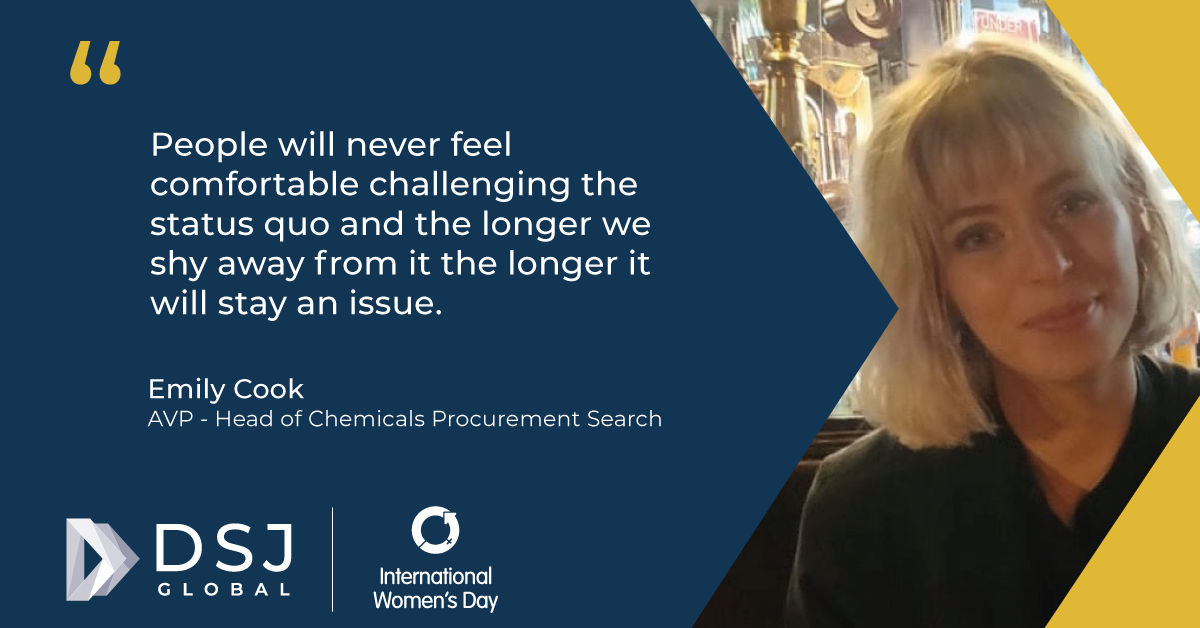This year's International Women's Day theme #ChooseToChallenge represents the idea of challenging norms related to gender equality to create change. At DSJ Global, we choose to challenge and promote gender diversity and inclusion. Emily Cook, AVP - Head of Chemicals Procurement Search, shares her thoughts on this year's theme, and how she chooses to challenge in her role.
What does the #ChooseToChallenge message mean to you?
People will never feel comfortable challenging the status quo and the longer we shy away from it the longer it will stay an issue. For me, #ChooseToChallenge is about encouraging people to speak out on gender bias and inequality, whether it be with clients, candidates or their colleagues, no matter how uncomfortable they feel doing so. It’s never going to be comfortable to speak out, so stop waiting for it to be. If we don't speak out and challenge, it will never change. We all know there have been many studies which prove more diverse teams perform better, as well as attracting and retaining talent. For the procurement function, it is essential to have diverse teams to be able to create innovation within supply chains.
What sort of conversations around gender equality do you have with your clients in your role? Has Covid-19 had an impact on gender equality?
The subject is becoming less of a taboo and most of the clients I speak with are more open about discussing their hiring strategy when it comes to increasing diversity; they recognise the importance of having more diversity within all functions of a business for the teams and the business to grow. The majority of people enjoy working with different genders, different cultures and people from different backgrounds. Often candidates see working with diverse teams and learning from others as their own personal and professional growth.
What role can recruiters play in challenging norms and creating change?
First of all, I think the relationship you have with your clients is the most important factor. Having an understanding of the company, their goals, their diversity strategy so you can be a business partner to them rather than a CV machine is vital. This way you will build rapport and create an adult to adult relationship where you can challenge each other. As a recruiter we can use our time and resources to reach out to out to a wider market and variety of candidates and introduce people that may not be in the companies network. This will help ensure that all people are getting equal opportunities, regardless of race or gender. Some clients may not be as aware of the importance of gender equality. This is where the relationship between recruiter and client is so important. Being able to have uncomfortable conversations with a client, and explaining the importance of diversity in teams, is where recruiters can impact change. Whether a client is aware or not, as recruiters, we can always start the conversation and make sure we are sending a diverse shortlist of male and female candidates to ensure there is an equal opportunity.
What advice would you give to a company trying to create a diverse hiring strategy?
To make procurement and supply chain functions that can provide for an equal world, the teams behind them must also be equal. Diverse viewpoints lead to innovative discussions, problem solving and creativity. It is a recruiters job to find candidates with diverse backgrounds. However, the client has a responsibility to attract diverse talent and keep them engaged throughout the process. Hiring managers and HRs talk about "company culture". However this is not tangible which makes hard to judge if a candidate will fit or not. As some people confuse culture, with like-mindedness. This could cause an unconscious bias. Therefore my advice would be to always have both a male and female on the interview panel, to mitigate this. Secondly, if there are no senior women in the team to interview, I would advise the company to be open about it with the candidates. And explain how they are trying to make a change in their leadership diversity. We know it doesn't happen overnight so demonstrating awareness of the problem, and a desire to make a change is important.
As a female leader, what advice would you give to other aspiring leaders in overcoming potential gender biases and achieving career success?
Make sure your opinions and your ambitions are heard. If people talk over you, call them out or pull them aside and explain how it made you feel, don't just sit back and let it happen. If you want to achieve something, don't wait for it to come to you, go and get it. Don't be afraid to ask for support if you need it. Communication is key, make sure people like your managers and other team leaders know what you want to achieve and come up with a plan together. Agree on how you are going to get there and how they will support you getting there and hold each other accountable.
_________________________________________________________
About Emily Cook
Emily leads DSJ's Chemicals Procurement search team for EMEA, having joined 3 years ago. The team is currently 5 people strong with further plans to grow this year.
